Issue Number 41, Summer 2018
Contents
- As the Mountain Dreams It by David Axelrod
- Compost Happens by Laura Grace Weldon
- Magpie Wars by Christie Nieman
- Colony Collapse Disorder by Aubrey Johnson
- Dear Bob by Jessie Laurel Benjamin
- Night on Fire by Kate Asche
- Petition to Common Sense by John Holbrook
- On the Dead Sea by Caroline Horwitz
- Marmot by Richard Anderson
- New Land by Katherine Espano
- Canyon Deep by Luke Wallin
- Timing My Breath by Gene Berson
- Queens Kitchen by Brigit Truex
- Cake Walk by Brooks Robards
- Natural History by Sally Long
- Blue Whale by Victoria Crawford
- Stealing the Days by Tim Raphael
- In Paradise by L.A. Weeks
- Instinct by Daniel Bourne
- First Cast by Gary Lark
- Daybreak, Eagle Rock by Gary Lark
- Whale by Devreaux Baker
- The Catch of the Day by Tom Sheehan
- Chasing Lizards by Josh Wennergren
- Quod Erat Demonstrandum by Krikor N. Der Hohannesian
- Across the Lake by David Crews
Archives: by Issue | by Author Name
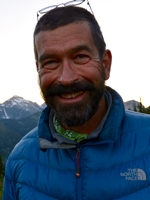
As the Mountain Dreams It
by David Axelrod
David has lived for 30 years in the Columbia River Watershed in the upper reaches of the Grande Ronde River between the Blue and Wallowa Mountains. His house is on the steep south bank of an abandoned meander, where the river flowed at the end of the last ice age.

There it is.
Or a glimpse of it anyway,
rising above the intervening ridge.
The dome of Glacier Peak
and the headwaters of five rivers
we live alongside of
in all our feckless shambles and uproar,
patrol cars speeding toward a lit-up rental
and raised voices late at night.
Johnnies-come-lately
we're the ghosts of a language
we can't understand.
At dusk, the mountain divides
shadows cast by its north-facing cirque
and alpenglow lifting along its southwest flank.
There it is. The world
as the mountain dreams it,
going on after as it went on before us—
spikes of elk sedge and calf brain
poking through duff at the edge of its July snowbanks,
a whitebark pinenut splitting its seed coat
centuries later inside a nutcracker's hoard,
the fascicles unfurling five elegant seed-leaves,
a little asterisk on a mountain that lost its glacier.
If people are inside some spectral order,
does it matter how
or how long we abide here?
Does whatever the mountain dreams end
without us,
if we wake in a world set afire?
© David Axelrod
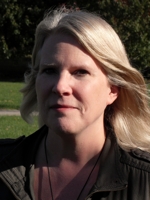
Compost Happens
by Laura Grace Weldon
Laura lives on a small Ohio farm where rain rushes toward Little Sweetly Creek, enters the Black River, merges with Lake Erie, and then the St. Laurence River on it its way to becoming the ocean.

Nature teaches nothing is lost.
It's transmuted.
Spread between rows of beans,
last year's rusty leaves tamp down weeds.
Coffee grounds and banana peels
foster rose blooms. Bread crumbs
scattered for birds become song.
Leftovers offered to chickens come back
as eggs, yolks sunrise orange.
Broccoli stems and bruised apples
fed to cows return as milk steaming in the pail,
as patties steaming in the pasture.
Surely our shame and sorrow
also return, composted by years
into something generative as wisdom.
© Laura Grace Weldon
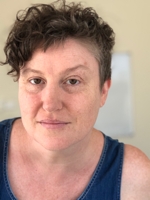
Magpie Wars
by Christie Nieman
Christie lives on Dja Dja Wurrung country in the box-ironbark forests of the Loddon River Catchment.
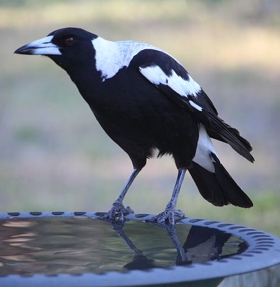
Even in summer the river is cold. When he gets home from his work in the city, they put on their wetsuits and hold hands and walk down through the weeds to the edge.
It doesn’t flow, this river. The water is still and deep. One time they stood on the bank and pushed a wooden pole into the water, pushed it down as far as it would go, over three metres, to the bottom. The river shouldn’t be like this. It should be broad and warm and shallow, but the two-hundred years of land-clearing for paddocks has caused the river to cut itself so deeply into the earth that it has turned salty and stopped moving. She stands on the edge and closes her eyes and imagines a flowing, shady, generous river moving slowly towards its wide-open mouth. And then she looks and sees a river that has died.
‘Hey, Honey,’ he says, ‘you want to see something funny?’
‘Yes,’ she says.
He squeezes his straight arms to his sides and then releases them, and they spring out away from his body, and bounce to a stop at a forty-five degree angle. ‘My wetsuit is too small,’ he says.
‘That is funny,’ she says.
It is baking hot so they leap in, icy water finding its way through zippers and seams to trickle over their skins. He duck-dives with his snorkel mask on and then puts on a weight belt so he can sink and investigate the steep edges of the river, looking for signs of life. She floats with her arms behind her head. She wonders when the two baby magpies will come down from their nest in the sugar gum.
He comes up spluttering.
‘An eel,’ he says.
‘How big?’
‘Not a baby.’
All they ever see are eels. And mosquito larvae. And mosquito-fish. Nothing else. No yabbies, no mites, no turtles, no leeches. So she has decided, and he has agreed. They are not going to add to the burden they see around them: the land-clearing, the overpopulation, the death of everything. They will do no more harm to this place or any other. They won’t have children.
He dives again. She reclines, body growing cold in the water, face burning in the sun. He surfaces silently, spookily, right next to her. She laughs.
‘We need to get you a flat rock for your belly,’ he says, ‘so that you can be like an otter and float there and crack open oysters on your tummy.’
He makes a wild guzzling-oysters noise and she throws her head back in the water and reaches for him with her arms. He comes in close, seal skin against seal skin.
‘How good is requited love,’ he says.
‘Good,’ she says. ‘Really good.’
A flat rock for her flat belly.
In the morning he leaves and she goes back to sleep. When she wakes again, she hears the baby magpies calling in the sugar gum. The tea he left for her an hour ago has developed a tan-leather skin. The alarm clock radio has been filling her sleeping mind with Gaza.
She lies for a moment and then sits up and turns off the voices and the stillness and the sound of birds reclaims the room. Outside a female magpie sits on a fence post, looking over the river. A family of magpies forages on the opposite bank. The female throws her head back, sending a blast of carolling their way, but the family ignores her.
As she cycles up the dirt road driveway, the male magpie makes contact with her helmet. She rides facing him, wobbling on the gravel, and he wipes his beak on a tree and glares at her. She reaches the bitumen road and turns and rides so fast her eyes stream. A Holden whizzes past her from behind, too close and too fast, sucking her into its tailwind. She pushes on but stops when she comes across the fresh body of an adolescent wood duck lying in the middle of the road. She drops her bike in the grass and approaches the duck where it lies. She hopes it isn’t breathing.
It is unmarked. There is no blood. She slides her fingers between the bitumen and the feathers. The bird is soft and warm: it feels alive. She lifts it and its head lolls as the long neck hangs down. A stream of blood flows from its bill to the road. She brings its delicate head close to her eyes. No breath disturbs the blood around the nostril. She carries it to the side of the road and sits next to it in the long grass, her hand firm on the still body, her fingers tucked into the soft place under its wing, waiting for the feathers to grow cool.
The train to the city passes through bare paddock after bare paddock interrupted by the occasional fluorescent yellow square of canola. Every few hundred metres a brown falcon sits high on a power pole or a dead tree, waiting for scurrying field mice to give themselves away. She spots every bird, twisting to look at their dark tear-stain markings, like rugby paint, as they recede in the distance. The outer suburbs of the city replace the open paddocks. Magpies nest here too. She sees them, high above the trees of the nature strips, dive-bombing one another. They can live anywhere, procreate under any conditions. She admires them.
Gina calls from across the food court. She waves an arm.
They always meet at the market; the coffee’s good, they can have lunch, buy their fruit and veg and then go to the agri-section and look at the ducks and chooks and retell their country childhood stories about each other.
‘I’ll get coffee before I sit down,’ she calls, and turns herself side-on, first one way and then the other, between chairs and prams and other pairs of women leaning in close over their coffees, and then back, cup in hand, through a sea of children to the table.
‘Christ almighty,’ she says. ‘Hello.’
‘Cheers,’ says Gina, and they clink cups.
They talk politics and siblings and art and exhibitions and property prices and mental health and work–life balance, and then she says, ‘I’m hungry, lunch?’
Gina says, ‘I don’t know if I will. I’m not feeling very well.’
And she notices, finally, that Gina’s cup is full of pale herbal tea, not coffee. And a secret, proud smile appears on Gina’s face, like nothing she’s ever seen before.
They hug, awkwardly, but the occasion demands it.
They go to the agri-section and look at the ducklings and the chickens falling over one another in their tiny cages, and suddenly she hates to see them like that. She hates it so much that she buys five ducklings and three chickens. She has no idea where she’ll keep them. The man puts them in a cardboard box with a bag of feed, and hands the box to her. She hugs the moving, squeaking box to her middle.
‘That was unexpected,’ Gina says.
‘I guess I’ll have to go,’ she says.
They almost hug again, but the box makes it impossible, so she waves goodbye with her little finger.
She sits in reception at his work with the whistling, scratching box on her knees, waiting for him to come down. She peers in the gap at the top. The ducklings scramble against the edges. They are afraid of her. She puts her hand in the box and lets it lie still, and after a while the little birds forget to be afraid. A duckling climbs inside the curl of her fingers, pushing its downy, padded breast into the warmth of her palm.
He arrives. He looks at the box. It scuffles and squeaks.
‘I’m sorry,’ she says. ‘I don’t know where we’re going to put them. I didn’t think.’
He sits down next to her. ‘It doesn’t matter. We’ll figure something out.’
They look into the box together and the birds panic.
‘They’re beautiful,’ he says. ‘I love them.’
They walk through the park to the station. She holds his hand, and with the other arm holds the box as steady as she can. Cyclists breeze past with eyes painted on the backs of their helmets and the magpies swoop anyway.
‘Gina’s pregnant,’ she says.
His grip on her hand tightens momentarily.
On the train they open the box so the conductor can have a look. Other commuters sit up in their seats to see. They smile. They can’t help it.
She closes the box and feels the movement of the baby birds against her belly. The ducks will interbreed with the wild ducks. She shouldn’t have done it.
He stares out the window, and as the train passes from suburban clutter into the openness of the barren paddocks, he looks suddenly worried. He reaches out and puts an arm around her, and she leans into him and into the motion of the train as it carries them home to the dead river.
© Christie Nieman
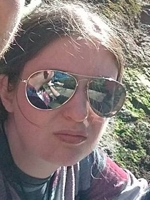
Colony Collapse Disorder
by Aubrey Johnson
Aubrey currently lives on the baked, red earth of the Lower Cimarron watershed, though she grew up in the Land of Clouded Waters, far to the north.

Ten million hives derelict,
and we know nothing except
sometimes we find orphaned
wings, thin panes of micro stained
glass gilded, fallen to our floors,
just as sometimes we find in the closet
his penny loafers, left behind,
and we are not sure what we miss
except that it is gone,
and we will someday die
without it.
If it were disease
or an equinox or vampire
mites or pesticides,
maybe it would scare us less
than this mass exodus
invisible, this cause we cannot
know except through weak analogy:
sometimes someone drives away
and leaves no forwarding address, doesn’t
call or write or say goodbye, becomes as vapor
freed from the boiling pot to evanesce.
© Aubrey Johnson
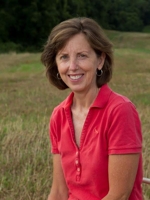
Dear Bob
by Jessie Laurel Benjamin
Jessie lives on the Piedmont plateau in southeastern Pennsylvania in the Eastern deciduous forest. Her home is in the historic Brandywine river valley adjacent to a meandering creek and her neighbors are the oaks, hickories and ash trees, as well as numerous winged and four-legged friends.

Crickets are humming. The Katydids stopped singing hours ago, and the Cicadas have yet to begin. As I open my eyes in the dark, the musty smell of early morning greets me as it drifts in through the window. The haze of sleep slowly retreats. I think of Bob. He’s probably still sleeping. Padding in bare feet, I feed the dogs, make a cup of tea and amble onto the front porch to watch the sunrise. Good morning, Morning. The wind is moving through the trees, branches are swaying, twigs are clapping, the water garden splashes, a blue jay squawks and a tufted titmouse calls “research, research.” Many sounds, but no Bob.
I go for a walk and hear the ominous “kee-auh” of the red- shouldered hawk that does nothing to quiet a mounting sense of unease. I worry - will this be that day? And I realize I have fallen hopelessly in love – with a bird. This love story began a few months ago, while meeting a friend for a walk at a local nature preserve. Pulling into the parking lot, I hear with stunning clarity “bob-WHITE, bob-WHITE.” Geez it’s been decades since I’ve heard one of those. I step out of my car and greet my friend Sue just as the brown-headed bird with a white throat and black eye stripe swoops down from its perch in the black walnut tree, lands in the gravel parking lot and marches up to us. He boldly looks us in the eye, opens his mouth and roars, bob-WHITE, bob-WHITE! Completely charmed, all we can do is laugh. We watch him for a while as he pecks at seed, jumps on the post and rail fence, calls again at full volume, then slowly meanders down the long lane like a kid kicking stones. There is a swinging, rocking motion to his walk and his head bobs side to side. The sight is both comical and disquieting. Why is he alone?
Except when they are nesting, bob white quail stay together in covies of twelve or so and, if the habitat is supportive, they rarely range more than one quarter of a mile. At night, they roost on the ground, banding together in a circle where each bird faces outward like soldiers manning their posts, protecting one another from harm and sharing their warmth on cold winter nights. Am I seeing the last bob white quail – like Martha (named after Martha Washington), the last remaining passenger pigeon who died in 1914 at the Cincinnati Zoo, a bird so rare her body was immediately frozen and shipped to the Smithsonian?
In southeastern Pennsylvania bob-white quail are not yet extinct, but they are as rare as the native grasslands where they nest. Tall bunch-forming grasses like the tawny broom sedge, the golden panicled Indian grass and the erect stems of little bluestems provide adequate cover, yet enable the quail to move through the fields while masking them from the soaring sky hunters – hawks and owls. The native bunch grasses have been replaced by sod-forming grasses introduced from Europe and Asia that preclude ease of movement, particularly for young chicks.
Chances are this bird is not wild, so who released him? Was it the Pennsylvania Game Commission or a hunter looking to train his retrievers? Maybe a school teacher who purchased quail eggs for a school project, each selling on-line for 99 cents. The students incubate the eggs, and the bird, no longer useful, is then set free by the teacher. But the quail is left to find his way in the wild: clueless, unprepared and without the support of his covey. These scenarios are disturbing. I contact the preserve manager to see if he knows anything about the re-introduction of bob white quail to the preserve. He doesn’t but surmises that a local landowner is responsible. He thinks it’s cool; I’m not sure. With few remaining hedgerows and brushy thickets, will they be able to escape the hungry fox or hawk? Will they find a safe place to nest that is away from the mowers used to cut the fields for hay before the nesting season ends?
* * *
Six weeks after we encountered the bob white at the nature preserve, while walking down the road from my home I hear through what sounds like a microphone, “bob-WHITE.” You’ve got to be kidding! I turn around and walk back toward the nearest tree, saying “Hey you,” and with that the bird with the scaly brown-white dappled plumage and barrel chest takes off, air moving through his wings like a muted whistle, lands within ten feet and saunters right up to me. Thrilled, I stay to watch him for a while, all the while wondering, What’s up with these birds already; it can’t possibly be the same one? That evening he sits in our neighbor’s spruce tree, calling like a blaring trumpet. My husband goes to investigate; our bird-loving neighbor comes to see what is going on. Then Bob joins us in the garden, pecking at yellow violet seeds, making funny cooing sounds. We watch him explore the garden, pecking here, pecking there, looking quite at home among the sedges and ferns. Towards dusk, he lifts off in heavy flight into the woods.
This is the summer of home renovation and there are a lot of workmen around. For a couple of weeks, there is a continuous call and response of bob-WHITE!” until I can no longer discern the difference between the human calling and the bird calling. Carpenters, electricians, plumbers – they all sing along with Bob, who is unflustered by the whack, whack, whack of hammers, the sharp buzz of saws, the thundering and vibrating boom of the generator; Bob enjoys being amid the fray, the more noise the better. One afternoon while I am walking around the yard and talking to Sue on the phone, Bob rounds the corner and nearly bumps into me. I say to Sue, “Bob says Hi.” He greets Richard in the garage and is rewarded with a handful of sunflower seeds, which he eats from his hand. On Monday mornings, the workmen arrive whistling, “bob-WHITE.” This friendly big-mouthed bird spreads an infectious joy wherever he goes.
* * *
It has been two weeks since I have heard Bob’s call. He has moved on, taking the active wonder of his presence with him, leaving only a sweet memory of a bird that came to visit, sang his song, was sung to, and then was missed beyond reason. I imagine Bob on a cold and starry night standing in a blanket of broom sedge with his covey; wing to wing, feather to feather, they share warmth and protection, Bob's eyes open and watchful.
© Jessie Laurel Benjamin

Night on Fire
by Kate Asche
Kate lives a ten-minute walk from the south bank of the Sacramento Bar section of the American River, where she and her husband run, talk with acorn woodpeckers and eat summer blackberries on Jim's Bridge.

Hot winds threaten
to smother us
with foul brush smoke,
courtesy of churning
wildfires eighty miles
close. We close
our house. Even so,
carbon-gilded air
cinders every sill.
I dream young
swifts treen treeeeen,
nesting in our chimney
with devastating faith:
small children in a forest,
a campfire left burning.
We set our one world
aflame, obscuring
any sign
of mercy, while ash
cloaks our fingerprints’
ghostly whorls.
We mark our foreheads
and bow. We mouth
a prayer. We eat.
© Kate Asche
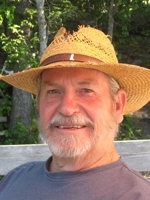
Petition to Common Sense
by John Holbrook
John lives in Missoula, Montana, along the Clark Fork River near its confluences with the Bitterroot and Blackfoot Rivers and at the of convergence of five mountain ranges in western Montana, all part of the extensive drainages of the Columbia River watershed.

Something tumbling on the road
makes the woman leave her small car rocking,
door ajar, emergency on. Car lengths back
she runs. Where a pickup slows,
a painted turtle lies, low keeled,
olive-green, patterned carapace
split where red spills. More like
a melon or soft clay bowl,
its eye fixed in one direction,
her mind reels.
Clouds of dust draw nearer—
glaring traffic everywhere
in waves of buckling August heat.
Leg stripped to bone, a flimsy claw
her finger lifts, she moves
from nausea to resolve, places
the lightly sculpted shell on grass
near dry asparagus
seeding a ditch bank path.
Purpose has no place where she stands.
Fields, wind, chrome, flash in
and out of view—and something else,
not cruel, wrong or fault,
and not without loss.
It wasn’t fear of finding
nothing inside herself
that made her stop,
cradle in a palm
the softly leathered belly plate.
As she pulled at tufts of grass,
as flies began to hover the loss,
she could only guess
if wilderness ever listened.
In the gathering dark,
slow lane home, growing weary
of tripping over sentimental guilt,
she felt, beyond what anybody
made of it, this sudden
death in life, bad break,
touched with light.
© John Holbrook
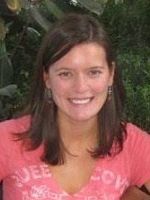
On the Dead Sea
by Caroline Horwitz
Caroline recently relocated to the confluence of three rivers in the Lower Allegheny watershed, following several years in the Mojave Desert and a brief residence in the prairie of the Great Plains.

At the lowest point on Earth there are bodies floating in the water.
Not dead—just extra buoyant from the high salinity of the Dead Sea. Even so, looking down the hill at these figures on the water rather than in it is somehow unsettling.
My eyes shift from the spectacle and settle on long white formations resting along the surf. They look like wave crests frozen in time, forever breaking on the beach in an inexplicable display of static energy. I look closer. It’s all salt.
The Dead Sea is the endpoint of Israel’s Jordan River, which runs south from the Sea of Galilee and nestles between the eastern edge of Israel and the western edge of Jordan. The latter’s dusty mountains and beaches are visible from where I stand. They look, at least from a distance, just like Israel’s.
Most of what I’d heard beforehand about the Dead Sea described it as a hot, greasy, over-rated salt-pit in the middle of the desert. I see a blue and brilliant sea.
My fellow grad students and I, visiting Israel for a field seminar, make our way down the hill and onto the undulating rocky beach. I remove my cover-up and hat but leave my sunglasses secured to my face to protect my eyes from any stray splashes of the water, almost ten times saltier than the ocean.
I want to protect something else, too—my wedding ring. I have no idea if such a high concentration of salt can harm it, but I’d rather not take any chances. I slip it off my finger and into an interior pocket within my bag. I’m not worried about its safety since a couple students in my group have opted to look at the sea rather than swim in it, and they sit near our belongings.
I slather myself in sunscreen, careful not to draw the ire of the fierce Middle Eastern sun. I step out of my flip-flops, then right back into them after the flat sandy rocks scorch my feet. I wear them to the water’s edge until I’m forced to abandon them.
I suspect that the temperature of the water is going to be quite warm, perhaps like a hot tub. I bend over and put a hand on the salt crust that comes up to my calves. It’s the color of drifted snow and hard and gnarled as stony coral. It’s not as warm as the rocks, so I ease my body down onto it.
All around me the other students are inching toward the water. We all move gingerly, testing out this new landscape that’s unlike any we’ve seen before. I’m ready to put my feet in. I wonder if the salty water will make me aware of any cuts or scrapes I don’t know about.
“Don’t shave your legs for at least a couple days prior, unless you like pain,” my sister-in-law told me before I left home. “The micro-cuts will sting like crazy in all that salinity.” She had travelled here in college and my husband, her brother, studied abroad here in high school.
Sitting on the salt crust, I stare at my hairy legs and then down at my feet and their chipped pink nail polish as I plant them in an inch of water. I sigh, as though in the back of my mind I half-expect them to sizzle off. The water is much cooler than anticipated.
I scoot myself off the taller salt crust and onto the underwater layer, smoothed by the constancy of the waves. I try to stand on this sheet, slippery and white as ice, finding my footing as I submerge more and more of myself. If I slip, I could propel face-first into the water or create a splash that lands in someone else’s eyes.
As soon as I’m in up to my hips, the powerful buoyancy takes effect and my legs are involuntarily drawn up from under me until they rest flat on the water’s surface. I giggle like a child along with my peers at the wondrousness of it all. We all knew this would happen—it’s the most famous thing about the Dead Sea—but somehow we couldn’t quite believe it until we felt it.
The water runs down my skin. It’s not as greasy as I anticipated, but there is something different about it, an entity within that I cannot name. The Dead Sea is said to have healing powers—more scientifically, its high salt levels are reported to be good for the body and the skin. I try to let it envelop as much of me as possible. With extreme care, I dip my chin into the water and splash a little on my cheeks, wary of getting it in my mouth or eyes.
I attempt to stand again and find that the pull is even stronger. The sea demands its inhabitants stay horizontal. My legs are yanked up behind me. I flail like a fish on land to keep my face out of water, right myself, and settle on my back again. I resolve to stay sitting or lying back if that’s what the sea wants. My hair dips into the water, and when it dries it will be hardened and caked with salty residue but I don’t care.
It’s odd to feel so high at thirteen hundred feet below sea level. The Dead Sea is named for the lack of life it fosters (not even plants can make their home within), yet I’ve never swum in water that felt this alive.
I look at a young woman standing on the beach, her entire body covered in black mud. I’ve heard of this before, the Dead Sea’s famous mud and its many therapeutic uses. Everyone in my group is too shy to ask the woman where to unearth the elusive substance. We’re still so new to this country and uncertain of who speaks English. Besides, she appears almost too regal to approach. The only person wearing the coveted coat, she stands tall and lithe and confident, gazing out at the sea like some sort of goddess.
We have only an hour here in the sea before we have to leave. I’m told I wouldn’t want to stay in the water any longer than that, that stewing in so much salt for long would pickle me, but it’s more inviting than I could have imagined. I’d like to stay on my back in this mystifying place that defies physics. Perhaps I could sleep and drift all the way to Jordan.
The sad truth, of course, is that the Dead Sea is disappearing. It shrinks by a shocking meter per year. Attesting to this fact are myriad sinkholes—a result of freshwater pooling and dissolving the ancient salt deposits—dangerously infiltrating much of the land around the sea. When my group first poured out of our tour van and walked to the edge of the hill, our guide informed us just how much had receded.
“This, right here where we’re standing?” he said. “The water reached it ten years ago.”
We were silent except for a few exhaling in amazement. Standing high upon a hill, we couldn’t even see the edge of the shoreline from where we stood. It was still a few minutes’ walk before we reached the water.
In ten more years, most of us will be in our mid-thirties—not so far away as we’d like to believe. How much farther will the water have receded if we return then? Floating now in four or five feet of water, I wonder how much deeper this spot must have been a decade ago.
We’re told it’s time to go. I rise from my supine position, reluctant, wishing I could stay just a bit longer in my otherworldly, mineral-rich habitat. I remove more and more of my body until undiluted gravity takes over again, no uplifting force suspending me from the ground.
I wonder if the sea has changed me in some way—my skin or my health or my mind. I doubt if I will ever feel such a sensation again, short of returning here, which I already yearn to do. I try to absorb every last step in the water, knowing some of what I touch may not be here this time next year.
Dancing back over the hot rocks to my pile of belongings, I find a stray piece of salt crust broken off the larger formation. I run my fingers against its grainy texture, bring it up to my nose to sniff a faint brininess. I take my wedding ring back out of my bag and tuck the piece of crust in its place—a souvenir for my husband, who collects shells, rocks, and sea glass from all of our beach trips.
I’m taking this small token back to him to spark his memory of a Dead Sea deeper and wider than mine.
© Caroline Horwitz
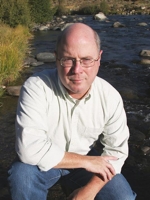
Marmot
by Richard Anderson
Richard lives in a town trying perhaps too hard to become a city in the middle watershed of the Truckee River.

I open the gate and stop
to see a marmot stopped,
standing, front paws raised
to my deck, ready to climb,
but made motionless by
my motion, staring
as I slowly step forward with
soft words to comfort, to
pose no threat.
An unexpected visit. Chipmunks, yes,
and chickarees, cottontails, gray
squirrels, ground squirrels, raccoons,
pocket mice, voles, a rare deer,
a rarer bear, not, though, some thick furred
cat-sized creature more home on
high meadows, sun-flecked granite.
What are you doing here, surrounded
by paved roads, gardens meticulously
tended, countless dogs off leash.
You are either foolish, fearless,
or desperate.
© Richard Anderson

New Land
by Katherine Espano
Katherine lives in the lower St. Johns watershed, Florida, about 15 miles west of the Atlantic Ocean.

We are loose coins
tossed from the ferry,
landing on the island
heads-up present
or tails-down past.
Each wild horse
is a shimmering question.
My older daughter rests on a log,
and my husband checks the ground
for signs of sinkholes,
earthquakes, and tsunamis.
Ahead is the beach
where I wept as a child, alone
under a Harvest Moon’s
bloodshot eye.
Wind sweeps the land
free of dust, and sometimes
we’re newer than we know.
My youngest runs
in her pink cloth diaper,
her arm raised like a mast.
The horses gallop over sand,
their manes aloft: wispy kites.
Dappled with sun, the oak trees
smell of salt and promise.
Our voices nest in the air.
© Katherine Espano
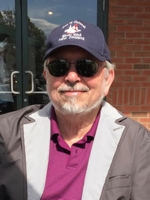
Canyon Deep
by Luke Wallin
Luke lives in the Sakonnet River watershed basin near the Atlantic Ocean on a stream that flows north.

Painting by Luke Wallin
Up a random switchback road you twist the wheel
try not to glance as
vineyards stretch out gracefully
then disappear.
Little black car of loaner luxury,
let’s go high and
high again,
lift above that
wine and tourist town.
Farms grow ragged, dead cars rust,
from steep inclines the
eucalyptus timber soars.
Late sky blues are fading pink,
fog can move like
animals after rain.
Oversize trucks come roaring down
displaying beards and
gauntlet-throwing stares.
Marijuana’s growing near, silent pit bulls
press the fences bound with razor wire.
You smell landline feuds and shotgun talk.
Then you’re way up, quite alone.
Park along the edge.
The shadow-bottom canyon
sends its warrior trees aloft.
Lord it’s quiet and chilly as the
ridgeline eats the sun.
Mountain lions move softly in the wet.
© Luke Wallin

Timing My Breath
by Gene Berson
Gene lives in the northern California foothills in the Yuba River watershed. Everyone goes to the river. Like a temple, with its falls its rapids its green pools, it seems to restore everyone in a personal way. We feel our kinship through it.

I got out of the car
into a fragrant gown of shade.
a magnificent fig tree
just beyond the edge of the bank parking lot
enveloped me, its scent carried me
back to my childhood
five years old
at the chicken coop
the skin of purple figs swollen and warm
dense green sandpapery leaves
the smell of dry shingles
the sweet smell of corn in my bucket
the quince next to the fence
like layers of clothing
decades
slipped from me and I stood
at the chicken coop door
knees bumping the pail
stretched to lift the hot doornail, pushed in.
squawking chickens gave way in a wave
— the kernels rattled like gravel
as I poured corn into the trough
a gray rat with unblinking eyes
plush as velours, nosed
out of a hole
then withdrew again. I dropped
the bucket. I stood there
the diesel engine of a Ram truck idling
at the drive-through ATM . . .
when its moist exhaust reached my face
I held my breath
as if holding back time
after it drove off
I breathed the reprieve of aromatic air
of the fig tree, spared
by a property line
© Gene Berson
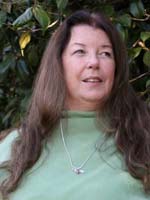
Queens Kitchen
by Brigit Truex
Brigit lives close to the South Fork of the American River, about 10 miles from where gold was first "discovered" by John Marshall in Coloma, California.

Heat-crazed Salinas soil
crackles. Beyond, the Coast Range
shimmers a blue mirage. Workers
wade through
the dry ripples, balancing
a shelf of sun on their backs
bent like lost shore-birds.
They search beneath serrated
leaves for seed-pocked berries
tapered to a nub between thumb
and finger, drooping
as sweat drips, mocking the memory
of rain. The fields shrivel
to scant penciled furrows.
In a clean, white kitchen,
someone will taste this harvest, more
salt than sweet. Grit.
Fruit, a future myth.
Previously appeared in the anthology, IN THE GARDEN (Poetry Box).
© Brigit Truex

Cake Walk
by Brooks Robards
Brooks walks and cross-country skis along the Mill River watershed in Northampton, Mass. In the summer she walks and swims near the Farm Pond watershed in Oak Bluffs, Mass., and she spends six weeks every winter hiking along the Gallisteo Creek watershed outside Santa Fe, NM.

Beneath feet, earth
yields gently in transit
to a desert windmill.
Monochrome skies will
bring rain after dark.
Ground’s cake-baked cracks
lead to a livestock water tank
where goldfish hug the bottom.
Orange flashes, a few albinos
in the mix, these outlanders
jolt the eye, feed empty spaces
between there and home.
© Brooks Robards
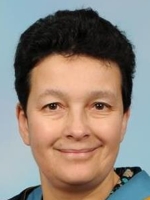
Natural History
by Sally Long
Sally lives close to the North Cornwall coast where the River Camel flows into the Atlantic Ocean.

Now here’s an interesting species.
Evolved in Africa,
considered itself the crown of creation,
assumed nothing would take its place.
Believed it ruled the planet,
took the earth for its own,
plundered it,
polluted it,
almost annihilated it.
The only species in history
to bring about its own extinction.
Homo sapiens,
“wise man,”
an interesting species.
© Sally Long

Blue Whale
by Victoria Crawford
In the forests and rice paddies watered by the Mae Ping in a Lanna valley of north Thailand, Victoria lives with three dogs, one cat, her husband, and her garden (as everything grows here like crazy). Her weather is brought in by the Tibetan massif and the South China Sea.

Furry faces, bewhiskered, crane their necks at us, sea otters
floating above kelp forest canopy. Slo-mo summer swells
as deep blue as pharoah’s lapis lazuli
as we kayak along Monterey Bay,
at the regulated distance to keep otters safe.
Liz’s voice, bio teacher tough,
focuses otter fuzzy button ears,
“Triumvirate stability,
kelp constant growth,
urchins eat the roots,
otters devour urchins.”
Sepia eyes round as pennies
revert to purple urchin meals
on their chests.
Out in the Bay, collie snouted heads
of sea lions pop up, to examine and bark,
indifferent to our paddled progress
as they sink down fishwards,
agile ease, liquid flow, to our pulling strokes
across waves in our uphill push.
Stroke, stroke, glide,
buff winged pelicans sky search, plunge,
wings folded tight, streamlined for
scooped snacks of mackerel, sardines, anchovies.
“Oily fish, good for the feathers” Liz explains
and I exclaim at aerial slides and arrow thrusts.
A blue whale’s massive head splits the sea
as he vaults into the air
in front of us. He breaches—
whale snot on our sandwiches.
Shadowy scars chase across rough skin,
orca wounds testament to titan life.
He arches into our realm
for uncountable time, the knobs of his spine
passing and passing
like the squares of train cars.
I tally aloud
the number of his visible ribs,
puzzling at their boniness.
Chill ocean wind moistens my eyes,
but dries Liz’s throat as she says,
“He’s starving.”
© Victoria Crawford

Stealing the Days
by Tim Raphael
Tim lives with his family in the Lower Willamette watershed on the flanks of Mt. Tabor, a sleeping, urban volcano.

Let’s agree that for this poem a stream is a stream.
Don’t mistake its drifting leaves for reveries.
Don’t ask it to leap from the ridge
and perform for you – cartwheel
and cut, down and through.
Spare it your ache for a primeval past,
before tree fellers and mills,
before it carried our stains
through the culverts below.
Rocks in its shallows are not memories.
Rocks are rocks. And please don’t
compare it to a silky canvas
where sun sparks paint shimmering landscapes
for the trout beneath.
It’s enough to be a stream on Pioneer Mountain
and kiss cold the current
up here by the spring. Among the alder
a rough-skinned newt stands still
and a barefoot man with cuffs rolled high
steals the last days of August.
© Tim Raphael
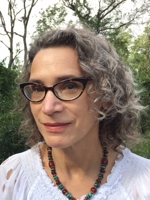
In Paradise
by L.A. Weeks
L.A. Weeks grew up in the Chesapeake Bay watershed. She now lives near Hood Creek, part of the Cape Fear River Basin.

In paradise, a mockingbird sings ungodly.
Weed whacker! Weed whacker! it tremolos,
backed by the highway’s predawn thrum.
The highway billboard glows, Take Next Right to Paradise
(where hardy palms dot clear-cut bottomland,
and golf carts cruise the hedge-trimmed deer paths).
Here, nestlings fall with the tangles of a cast-off paradise.
At daybreak, mockingbirds feast on Army Worms;
tomorrow’s liquid application will restore
the lawns of paradise. Then, cannas, begonias,
and banana trees will be fertilized with chemicals
simulating forest floor–loamy bits of leaf and wing
bagged and sold to the song of windup birds in paradise.
© L.A. Weeks

Instinct
by Daniel Bourne
Daniel lives on one of the small upland ridges between the Funk Bottoms and the Killbuck Marsh, two important bird migration stop-overs along the east/central Ohio corridor. Killbuck Creek, which flows through the Marsh and also gathers the waters from the Funk Bottoms, eventually flows southward into the Walhonding, then the Muskingum, and then the Ohio River.

A small car, and a big snapping turtle
laying eggs in front of its bumper
as we turn a corner
in the Killbuck Swamp. This boy
looking through the windshield
of his rusting Plymouth
doesn’t move an inch. He’s here
on this planet
to protect this clutch of eggs,
or at least
to wait decently
for the turtle to finish
before he kills her
for grilling or for soup.
But the turtle
is oblivious:
her hard beak
curved like the earth.
Big paws scraping
through the gravel
the local township
deposits each spring
to try and stop the mud.
© Daniel Bourne
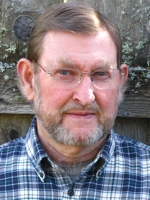
First Cast
by Gary Lark
Gary grew up on the Umpqua River and considers it his primary mentor and metaphor. He currently lives near the Rogue River in Oregon.

The lake, a glittering sky.
Fish dimple the clouds.
Reeds brush a mountain’s cheek.
Morning canoe angles me through trees.
I ready my line and cast
in the province of dragonflies.
© Gary Lark

Daybreak, Eagle Rock
by Gary Lark
Gary grew up on the Umpqua River and considers it his primary mentor and metaphor. He currently lives near the Rogue River in Oregon.

Morning arrives
with a cool whisper.
River slides from mountain belly
lucent and green.
I flip a fly into the current,
strip out line that curls
between rush water
and boiling eddy.
A steelhead rises in the dream
we share, rumors my shadow
and fins to the chert bed,
sun rising for us all.
The scent of river mixes
with fir, pine and moss
as I set off down the trail.
The creee of osprey turns above.
© Gary Lark
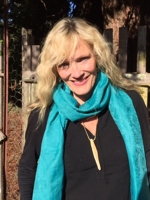
Whale
by Devreaux Baker
Devreaux lives on the coast of the Pacific Ocean in the Big River Watershed.

The morning we found the whale we had walked for miles
The ocean on our left kept calling us
to take off our clothes, slide into her arms
We kept searching for some private place to undress
until in the distance we saw the rounded curve
against the beach and
thought, a perfect dune to lay against
until we were close enough to see this great
soft curve covered with sand and scars was a whale
and we felt as though we had entered a holy zone,
where the world stopped her
purposeful spinning so we could pay homage to
this life slipped out of the sea
one lost note from some ancient song
Previously appeared in author’s collection, Hungry Ghosts, 2018
© Devreaux Baker
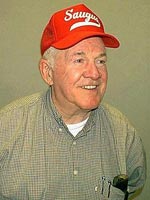
The Catch of the Day
by Tom Sheehan
Tom lives in a house built in 1742 about 200 feet from the Saugus River in the Saugus River Watershed bounding 900 acres of the Rumney Salt Marsh and 450 acres of a wetland, Reedy Meadows.

Three of us for dozens of years were tight as a fist. No one could break us up, and a few had tried that on a few futile occasions, even when we gentlemen were fly fishing on one or more of the local streams, dawn afloat, May alive after a harsh winter and a tough early spring. Patterns were set betwixt us, like specialties of the house or garage or personal workshop, toil and turn at obstacles and unfinished tasks were before us who by each one's choice in life's work had brought the gifts of ideas and applicable and talented hands to extend those gifts. For each one of us possessed odd and different talents in electrical, mechanical and brute strength applications and peculiar other interests like coin and stamp collecting, scrap book organization and minimal, but touching artwork by a loving touch, family interest passed down from a parent or an older sibling.
But the sea, above all things on the face of the earth, called us as if we belonged to it ... dipped, doused, and blessed in it and by it by fathers that we assumed had been so dipped, doused and blessed, kind of a chain of command, dare, do and get done.
Eddie’s call came at 4:00 in the morning. His whisper, not wanting to wake his wife, said “Great storm at sea last night. Want to check the beach?” There was a stretch in his voice, a need seeking its own echo, a call for companionship ... even if there were no payback. I could picture him silent in his domain, five boys still asleep, his rugged little frame moving soft as a shadow, not a speck of alarm about his person.
An awakening grace also said it was Saturday. That’s all it took in the darkness beside my wife, turning, stretching, eyes blinking, rolling over, going back to sleep. She knew it was Saturday too, her children sleeping as well.
Once before, after a storm out on the Atlantic, we had found a dozen quahogs at Nahant Beach, picked them off the sands with an assortment of sea clams on the mile of curving beach along the causeway linking islanded and insular Nahant to the City of Lynn. For years we had swum at Nahant Beach, had evening cookouts, and watched the girls for long, hot summers measuring how their beach wear changed with the years ... sometimes within a week of mutual attractions.
The beaches and the rivers had their own calls.
In silence, in darkness until I reached the kitchen, I left a note for my wife: “Storm at sea last night. Will be at Nahant looking for quahogs to stuff and bake. Eddie called. Ray and I are going.”
The morning was special. A summer nip climbed in the air, saying, as ever, that Saturdays are full of expectations. Salt was finding its way inland. Some of it , we knew, was imagined, manufactured by similar minds and hungers, but salt has a reasoning power that seems to say, "Why not?"
We did not bring baskets or bags, but hurried to view the scene, not to be left out of the treasure yield the storm and Father Atlantic might have tossed onto the beach. Each of us possessed his own picture of the find, the magnitude or the false call of a storm falling short of an entire beach. On the way, in Ray’s car, an old green Studebaker that smoked and made strange noises, we talked about grinding them up for baked stuffed quahogs for munching during TV hockey games, or for freezing them, after being ground up, to use in Thanksgiving turkey stuffing. Some would be earmarked for adding to the menu of a corn and lobster clambake classic in one yard or another, and a large copper pot loaded with seaweed sitting atop two camp stoves ... in some selective site we had not yet discovered. Romance comes in many forms, like expectation, delivery, consumption.
There was no traffic in our five-mile ride to Nahant, the sun just burping over the horizon, Europe halfway through its day, hastening, beckoning, saying goodnight sooner than later. And we were beach-bound. We would meet Europe and the Atlantic, and whatever they would bring our way, in a long curve of sandy land.
We hit the beach, as we drove onto the causeway, and were stunned. There in front of us was the mother lode. As far as we could see, along the strand, the beach was littered with quahogs and sea clams, all sizes, all thicknesses, spread out as vast as spilled riches from a kingly chest. In joy and surprise we screamed at each other for not bringing baskets or plastic bags to carry off the loot. Hunger tantrums made way on us; famous past meals in the mix, coming gatherings with a collection of friends not fazed by our riches, but admittedly jealous of the find. The forgotten taste of baked stuffed quahogs in one of our back yards came back in a hurry, the flames low and unhurried, the tastes higher than the hog's. Tabasco sauce, a glass of wine or a glass of beer, a kiss from the wild Atlantic was a kiss from a cook parading about like a chef at a gala seldom reached.
Scrambling for anything to carry Atlantic's loot back to the trunk of the car, we found an old pair of wading boots and two old work jackets. We rushed up and down the beach, filling all the limbs of those boots and the jackets, lugging them to the car. We filled the trunk and then the back seat. It was exhausting work, running back and fro, waiting for the hungry crowd to come over the horizon, to get their share, as if Europe itself had salted the sea for us, fed the long journeys for our treat.
We thought the morning was as complete as it ever could be, the three of us, Pine River fisherman, trout fisherman, who were mesmerized by sea food … cod, tuna, haddock, lobster, clams, shrimp, sea clams, quahogs, the catch of the day.
But, in another wake-up call, another step in this grand day, another surprise beyond surprise, along the paved walk of the strand, on an old-fashioned skinny-tire bicycle, going slow, studying the beach, came an elderly gent. To say he wore a shirt and tie, on a Saturday, and a blazer, would say little, for he came to us as if he was actually scripted for us out of an old Adolph Menjou movie, or a Fred Astaire dance special. He sat regally, properly, thin and upright on the seat, seams in his trousers as though but minutes before those seams had been pressed by a steam iron into implacable place. His shoes shined like new pennies. On the bottoms of those pant legs, the cuffs folded as neat as table napkins for the royal meal, a pair of old fashioned pants clips were carefully set in place as if measured for the fit. Something told me, in an unknown voice, magisterially, soft but magnetically, that he was on the same hunt we were on, but a whole lot neater by long habit. We asked him if this was his regular morning constitutional, from insular Nahant back behind him for a mere mile, to pedal the causeway out and back, to keep fit what was an 80 year old body, at least.
“Not really,” he said with a soft smile, a gentleman speaking. “My wife, Mirabel, we’ve been married almost 60 years, sent me out to see if I could find two or three quahogs she could stuff and bake tonight, in the late evening most likely. Oh, she had a light in her eyes, she did, a proper light, and I know she’d find a nice bottle of wine secreted some place in the house, and we’d have ourselves a grand evening. Rich salt air, a little wine, music from a favorite old opera right from The Met or from La Scala itself, and baked stuffed quahogs. It can’t get any better than that." He shook his head very lightly, and added, "It mustn't” He smiled the soft smile again. He was not out to beat anybody in any part of this small world.
The old man, we believed forever after, had found Nirvana and Utopia.
Ray, quick to spread his wealth, opened the trunk of the car. Quahogs, like huge coins, spilled onto the pavement. We filled the little basket sitting across the handlebars of the old gent’s bike. A dozen quahogs, loaded with promise, sat like the riches of the Orient.
The air was special. Saturday was special.
Eddie said, “Do you want us to follow you home and make a special delivery, a big delivery.”
“Oh, dear, no,” the old gent said. “That would only spoil it.”
To a man we knew what he meant.
We never saw him again.
We never saw the beach littered like that again.
We never made that trip again, time having its way, and mortality.
But I think about it often, and all the players on that special Saturday.
© Tom Sheehan
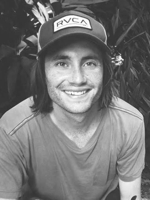
Chasing Lizards
by Josh Wennergren
Josh lives at the feet of the Wasatch mountains near City Creek of the Jordan Watershed.

Normally the color of the Great Basin sky is deep sapphire blue. Sharp light hardens canyon-rim shadows and bolsters crag lines that shatter the red rock. But today, an hour outside Moab, an eerie white sun drifts over a layer of high smoke, washing out the day with flat grey light. Gusts of cold wind splash off rusted cliffs, and further off comes the sound of raven-croaks plotting a lonely course across the sky. In this moment is a touch of gloom. It happens sometimes—just the right point of afternoon, the aimless light, a night of lousy sleep—these factors gather at once, spinning a pang of sadness through me. With that come all the nagging, melancholy thoughts of our time: How will we fix this world? Do we even have democracy anymore? Will hate win? Will my generation’s children know what a snow day is?
But then, pausing my untethered mind, is a tiny lizard crossing the trail. It scurries by my feet and mounts a rocky shelf where it stops, presses its chest into the air, then slips away. I snap back into the present moment where I find myself resisting a usually-dormant instinct to chase. Just as I am about to bolt after the creature, I think: It would be silly for a thirty-year old guy to go chasing a lizard. If other hikers passed by, it would probably weird them out. But I’m not sure I care.
Twenty years ago I was a ten-year-old boy stalking lizards over these same rocky buttes. Their soft movements rolled me over boulders of shadow and sun, ushered me to secret nooks. I followed their winding paths through the desert, up side-canyons to the tops of mesas, and into Juniper groves —patiently tracking one on and on until it dipped into a crack or burrowed under foliage. Then I would walk in silence until another lizard shimmered in my periphery, steering me deeper into the land.
I spent hours rapt by lizards, so intent I’m surprised I never got lost or took a bad fall. I was obsessed, once electing to spend an entire morning away from my scout troop just to chase lizards alone. If I caught one I would study it—marveling at its pulsing turquoise throat, inspecting the little holes on the sides of its head, gently holding its bent, flimsy toes in my fingers. Then I would set it down, step back, and watch it sidle off to cover.
On one trip I flipped over a stone near our family’s campsite, accidently killing a lizard that was hiding underneath. I felt sick. The reptile squirmed for a second, then stiffened in the dry air. Later it turned a vibrant hue of tropical green that nearly glowed. Filled with misgiving, and wishing somehow I had only stunned the animal, I checked on the delicate corpse all day. No, it was very dead. The next morning the body was gone and the sand where it had laid was smooth and trackless. I was lump-throated for the rest of the weekend, dwelling on the mystery of what night-haunting creature might have snatched it up.
Lizards meant everything to me.
But as I grew up, other things took priority. Family trips to the desert became harder to place into our schedules. In junior high and high school, lizards did not exactly fall into the ‘cool’ category. College trips to the red rocks were about climbing, then beer and camp fires. Life, as it goes, bustled with too many obligations and expectations, too many reasons to keep on society’s path. I have never stopped visiting the wild, but it has been too long since a darting lizard has coaxed me into its sparse, open realm.
Now as an adult, I face big questions. We all do. Millennials are grasping the reins of a broken world, desperate for fresh ideas, perspectives, and leaders. We are inheriting an existential mess that no other generation has confronted. Our problems are urgent, yet somehow, amidst these looming trials, chasing a lizard makes perfect sense to me. We cannot keep swiping past the small moments—the little flashes of wonder scuttling across the sand. We cannot forget to peel back the corners of this universe, to spill over hidden rocks, to wander far off the prescribed trail where the crunch of one’s own footsteps stifles the whirling belt of sensational news.
Ok, I tell myself, I’ll follow the next one. But, in character with this odd day, no other lizards cross my path. It is getting late, and probably too cold. The sun is leaving. The lizards have likely settled for the dark, and I too head back for camp.
But there is comfort at night as I lie in my bag, knowing they are still out there.
© Josh Wennergren
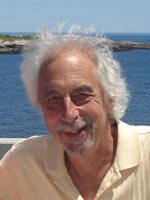
Quod Erat Demonstrandum
by Krikor N. Der Hohannesian
Krikor lives next to the Mystic Lakes section of the Charles River watershed which empties into Boston Harbor - now relatively cleansed of pollutants.

By noontime you could hear the heat
sizzle like a pancake on a hot griddle,
the buzz of the cicadas, the whirr
of air conditioners up and down the street.
And you could smell it, too,
the stench of New Jersey chemicals
on the southwest breeze
come all the way to Boston.
Three o’clock and the wind flip-flops,
east off the Atlantic, the temperature
drops 20 degrees in a half hour –
to meteorologists, air inversion,
to us, relief from the steam of August.
Upside down, I tell you…
It’s been this way since March’s heat wave.
The hydrangeas exploded in May
and Rose of Sharon in June, their bloom
dropping two months early.
The tomatoes droop from blight,
blossom ends rotted. They say
it’s much worse in Iowa and Nebraska,
a hundred-year drought. Corn stalks
balk at pollination, soy beans shrivel
in desiccated fields.
On the outer Cape off Ballston Beach
a great white bites a man’s leg,
the first such attack in decades.
Either he ventured out too far or
the shark too close to shore, depending
on whether you believe the man or the shark.
This much I know – the great white
likes harems of seals and temperate waters,
the Gulfstream is shifting course.
The deniers bluster “no” to climate change,
“no definitive proof” they huff. But
this I also know – as a boy I could forecast weather
three day’s out based on the wind’s direction and speed
and whether the clouds were cirrus, stratus, or cumulus,
or if there was dew or killer frost on the ground at sunrise.
You only need open the window,
feel the breeze, look at the blue
of the sky, the white of the clouds
or slate gray of overcast and watch
the ocean’s wave action
to understand what’s coming.
© Krikor N. Der Hohannesian
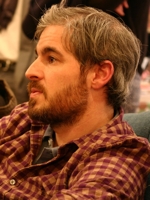
Across the Lake
by David Crews
David lives in the mountains and mixed deciduous forests of northwestern New Jersey, near where the Appalachian ridge will often frame a sunset or serve as a migration route for a great number of bird species.
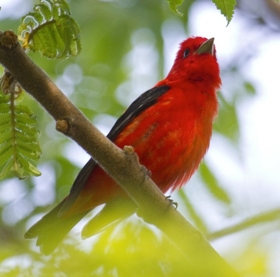
Photo by Heather Wolf
If I remember the lake yesterday, the tanager
deep in the woods, it feels like a memory
lost in a series of new ones, each singular event simply
a tanager in a tree. And then there are only trees, a huge
blue sky.
Say it is not gone; I cannot find a tanager. It is only gone
when you are looking for it. How the day passes
more brief than the one that came before, when a late
evening chill
spills down your neck, the way the forest goes quiet. I want
to tell you that tanager will always remain a scarlet flutter
in the high canopy, will beckon you to see in a rush of color
the fleeting moment, your day just another day
across the lake. And the tanager, do not try
and take it with you, but listen instead to this song. (He pulls
her close, a hand in her hair.) This talk of tanagers stirs
your thoughts, your eyes tell me so. It is here at the lake
where you feel most alive. Tell me you love me, and this moment
will be ours, will fill with our living. When you wake
in the morning I am the song in your resting hair, the softness
of your mouth, and my touch
tells you so. The tanager across the lake you will never hold
inside your delicate hands, how to hold so much color.
But we are here now, and the lake is here, the tanager
here. We should only ask for so much.
Previously published in Bird's Thumb, June 2017
© David Crews